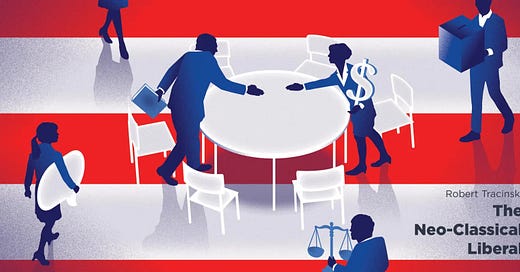The Case for Neo-Classical Liberalism
Introducing a new monthly column from Rob Tracinski that will discuss what liberalism is, why it’s threatened and why we need it
Political and ideological coalitions tend to look timeless and stable—right up to the point when they fall apart. Are we at such a point today?
The coalition that has long supported the Republican Party and the conservative movement was a fusion of free-marketers, religious conservatives and foreign policy hawks who joined together during the Cold War to fight communism. But the Cold War is over—even if tensions with Russia are not—and this coalition is coming apart. You can see this in new talk about a “common good” conservatism that embraces big spending and economic intervention, as well as increasing conservative invective against free markets and against individual autonomy.
The Democratic Party has its own coalition of old-fashioned liberals who want a moderate welfare state along with a government that keeps its hands off our private lives—cohabiting with a much more radical and much more vocal progressive faction that embraces outright socialism and wants to tell everybody what words they can use. That is the conflict we’ve seen coming to a head in liberal complaints against “cancel culture” and in the small handful of conservative Democrats digging in their heels against a big spending bill padded with the progressives’ wish list.
As I pointed out recently, the ideological coalitions we take for granted today are not permanent. The U.S. has gone through half a dozen major party alignments, and they have tended to last for 30 to 50 years. That means we’re due for a change.
More important, given the rising challenge of illiberal ideologies, both at home and abroad, a new coalition is necessary to revitalize liberalism.
Is Liberal Democracy Still the Future?
In retrospect, the high point of our current political alignment was the collapse of communism in Eastern Europe, which led to a period of triumphalism in which the general consensus was that some form of liberalism had won the great global political debate, and the only question was which form of liberalism we would adopt: a more free-market, small-government classical liberalism, or a more 20th century, big-government, welfare-state liberalism.
We can no longer be so complacent. Liberalism of any type now faces profound challenges at home.
On the right, many conservatives are in the process of adopting a blustering nationalism that admires Vladimir Putin’s Russia and regards freedom—once the uncontroversial rallying cry of the right—as the root of our problems. In concrete political terms, this wing of the right recently plotted to overturn the results of a presidential election by declaring a “national security emergency.”
Meanwhile, many on the left have embraced an increasingly authoritarian approach to economics while attempting to quash discussion on a whole range of issues, from gender ideology to global warming. People who were once considered prominent voices of liberal tolerance are now routinely denounced as bigots for not adopting the latest fashions dictated on social media.
And it’s not just at home. Authoritarianism is now the rising, aggressive model of government across the world. With our withdrawal from Afghanistan, the Greater Middle East is once again a battleground for rival dictatorships. After decades of piecemeal liberalization, China has been moving back toward a kind of neo-Maoism, tightening its grip on what its own people can see, hear and think; crushing dissent in Hong Kong; stepping up threats against Taiwan; and attempting to use economic power and propaganda to support illiberal regimes around the world. (China just got Daniel Ortega’s revived dictatorship in Nicaragua to rescind the country's recognition of Taiwan.)
Probably the most dangerous sign is the spread of right-wing authoritarianism in Eastern Europe, which now serves as a model and inspiration to the nationalists on the American right. It has been a while since the American system has faced a serious challenge from a global ideological rival—much less one that enjoys the sympathy of a significant domestic faction.
In the face of these challenges, advocates of a free society must all hang together.
Neo-Classical Liberalism
This is why I’ve been arguing that we need an ideological realignment in which various stripes of liberals find ways to work together and realize that our differences should not prevent us from making common cause. I describe this new alignment as “neo-classical liberalism,” a combination of the most common version of liberalism on the left—the market-friendly neo-liberal—and the most common version on the right—the libertarian-leaning classical liberal.
The important shared concept here is “liberal.” A liberal is someone who thinks that freedom is one of the central principles of any just, moral and flourishing society.
We need to start thinking about what a broadened liberal coalition would mean in terms of overarching principles and a political agenda. What follows is not quite a neo-classical liberal manifesto—it’s too early for that—but more of a starting point.
Protect free elections. No other freedoms can be maintained unless the government answers to its citizens in free elections—unless the party in power can lose an election. There is a long history of politicians making irresponsible claims that the vote was “rigged” when they didn’t win. But there is only one movement right now that is attempting to control the apparatus of vote-counting for the purpose of overturning election results. Part of the point of finding a wider agenda we can cooperate on is to help us remain unified so we can work together on this crucial, single issue.
Guarantee free speech. There is no way to correct an error if people are not free to criticize the status quo. But freedom of speech has to be more than a legal guarantee. It has to be a cultural norm. We need to regard vigorous debate on the widest possible range of issues not as a threat to the truth, but as a necessity for reaching it. And we need to be prepared to support those who are targeted, particularly by “woke” online mobs, for challenging prevailing dogmas.
Fight regulatory ‘cost disease.’ The most difficult area for different kinds of liberals to work together is in economics, where we disagree on the size and role of government. But one area where we can agree is addressing how restrictive regulations and reckless government subsidies—from NIMBYism in housing to tuition inflation in higher education—conspire to make the major expenses of life less affordable.
It goes without saying that free-marketers will happily get behind a critique of regressive government regulations—and it might even do more good than, say, reducing the top marginal tax rate. Center-left liberals, for their part, should be open to the argument that if government is going to be a force for good, it had better do things that actually help people, rather than allowing itself to be captured for the benefit of entrenched interests.
Big-government liberals have gotten themselves trapped in a cycle of “cost-disease socialism,” where government restrictions drive up the ordinary costs of living, which then need to be covered by ever-increasing government subsidies. But what helps people more—a bureaucratically administered handout or a liberalized system that prevents them from needing the subsidy in the first place?
Defend free markets and free trade. Tucker Carlson endorsing the agenda of Elizabeth Warren ought to be a bit of a wake-up call. The nationalist right has rediscovered a Big Government agenda, and particularly the arbitrary use of antitrust—but for the openly avowed purpose of punishing whomever they perceive as the enemy, particularly media companies. Similarly, the nationalists inveigh against the evils of trade and commerce, but only as a tool to reimpose a nostalgic vision of traditional morality.
Both classical liberals and center-left liberals need to refocus their attention on the authoritarian possibilities of a government-regulated economy. It is a staple of authoritarian regimes, from China to Russia to Hungary, to make businesses so dependent on the good graces of government that they dare not withhold support for the party in power. Ronald Reagan used to say that a government big enough to give you everything you want is also big enough to take everything you have. We should also bear in mind, as the previous presidential administration reminded us, that a government powerful enough to do all the wonderful things you hope for is also powerful enough to do all the horrible things you dread.
In particular, it is important for the anti-authoritarian center-left to craft its own independent economic vision and agenda—one that embraces the market alongside the welfare state—rather than merely adopting a watered-down version of the latest utopian vision offered by the radical left.
Fight authoritarianism. We need to pull our foreign policy back out of its post-Iraq, post-Afghanistan funk of defeatism and commit the U.S. once again to the defense and promotion of liberalism and representative government around the world. The goal of our current policy seems to be to manage one retreat after another—in Afghanistan, in Ukraine and next in Taiwan—and simply hope that each new withdrawal will not be too embarrassing. Meanwhile, the dictators swallow up more of the globe, gain in power and influence, and provide models to be emulated by advocates of authoritarianism at home.
We can argue about what we can do to push back, but the top priority of our foreign policy should be to undermine authoritarian regimes and roll back their advance.
'Join or Die'
I do not think for a moment that the cause of liberalism is doomed. A free society offers so many advantages and liberates so much human talent and creativity that it will always be more powerful and more appealing than any form of illiberal society—over the long run. But our current moment is one of rising challenges to liberalism and of defections and retreats from the liberal cause.
This is a moment of crisis, and it is time to start acting like it. The very first thing we can do is to combine our powers and work together against illiberalism, whatever side of the supposed political spectrum it comes from. As Ben Franklin’s Revolutionary-era slogan put it: "Join, or die." But that is going to mean breaking out from old partisan loyalties, questioning long-held assumptions, and doing fresh thinking about what liberalism is and why we need it.
That should be the task of a neo-classical liberalism, and it will certainly be the task of this column.






